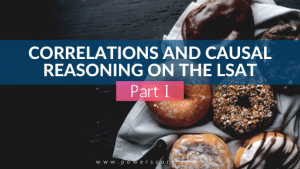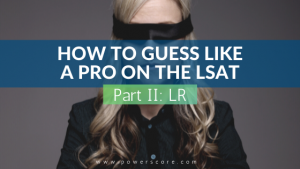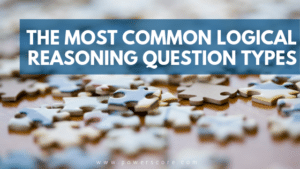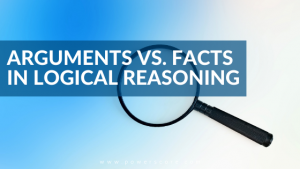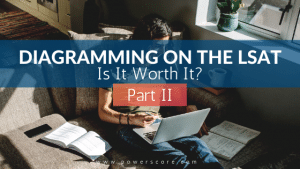Confused by the use of the use of the phrase "either/or" in LSAT questions? You aren't alone! And, you might be even more confused when the phrase "but not both" is thrown into the mix.Dave Killoran breaks down how "either/or" works on the LSAT to a student on our LSAT Forum, and discusses the effects of the "but not both" phrasing when it is used (tip: it has a big effect). Since this phrase appears most frequently in Logic Games, you have … [Read more...]
Main Point Questions on the LSAT
If you've ever taken a practice LSAT, you've seen at least a few Main Point questions. They often accompany Reading Comprehension passages, and they appear in the Logical Reasoning sections of the test as well. Regardless of the context, the ability to recognize an author's main point is a crucial part of understanding any stimulus or passage. The right approach is vital if you want to attack Main Point questions effectively and … [Read more...]
Correlations and Causal Reasoning on the LSAT Part I
The makers of the LSAT frequently create arguments that conflate correlation with causation, and thus you must understand the distinction between the two. This is the first in a 3 part series that discusses Correlations and Causal Reasoning on the LSAT. Let's get into it! Correlation & Causal Relationships In statistics, "correlation" refers to a statistical relationship between two interdependent variables (e.g. height and weight, studying … [Read more...]
Logical Reasoning Cause and Effect
The latest PowerScore LSAT Forum Post of the Day (found here), features one of our students who asked an interesting, and common, question about cause and effect relationships in LR.PowerScore Senior Developer Jon Denning weighed in to explain in a bit more detail exactly what we mean when we tell students that “causal relationships on the LSAT exist in a vacuum”. This is a great example of not only how the information and scenarios you’ll … [Read more...]
LSAT Tip! Beware of Tips…
It goes without saying that some advice is better than other. But when it comes to the LSAT, unfortunately, bad advice is quite common. This is largely due to the complexity of the exam itself, which does not lend itself easily to quick tips or easy shortcuts. More importantly, you can circumvent shortcuts. And test-makers often do just that. Guess what? They have access to the same test-prep materials as you do. If there is a shortcut they can … [Read more...]
How to Guess Like a Pro on the LSAT Part II: Logical Reasoning
As you know, there is no penalty for guessing on the LSAT. So, it goes without saying that you shouldn't leave any questions blank. If you are running out of time, make sure to guess on any unanswered question. Because some answer choices are more likely to occur than others, you should not guess randomly. Precisely how you guess, however, depends on how strong of a test-taker you are, and which questions you need to guess on. Let's … [Read more...]
Should I Study Formal Logic in College to Prep for the LSAT?
Given the emphasis on Logical Reasoning on the LSAT, students often wonder if they are missing out by not taking formal (or deductive) logic in college. Deductive Logic in Courses Granted, some exposure to deductive logic doesn't hurt. At their best, such courses will:Teach you the fundamental concepts of symbolic logic. Help you understand the difference between valid and invalid arguments. Train you to use symbolic language to … [Read more...]
5 Steps to Approaching the Answer Choices in Logical Reasoning Questions
1: Determine Know what the question stem is asking you to do. Although there are a myriad ways to ask the same question, there are only 13 basic question types on the LSAT. Take a look at the following example—all the question stems listed below belong to the same type of LSAT Logical Reasoning question (Justify the Conclusion), requiring you to identify an answer choice that proves conclusion of the argument:Which one of the following, if … [Read more...]
What to Do When You’re Feeling Defeated by LSAT Prep
Our free to use LSAT Discussion Forum is a tremendous resource for any student gearing up to take the LSAT and apply to law school, and while I'm sure the majority of our blog readers frequent the Forum and participate, it's easy for helpful posts there to slip through the cracks. In an effort to help our readers here stay fully informed, we occasionally have highlights of common questions we encounter in the forum. Two things first:Go use … [Read more...]
The Most Common Logical Reasoning Question Types
If your LSAT is fast approaching, you're inevitably wondering how to best prioritize your study efforts. A good place to start is figuring out which Logical Reasoning question types to focus on. To that end, here's a dissection of released LSATs from June 2013 to June 2015. Let's see exactly what the test makers have emphasized and what they've relegated to a back shelf. After all, if you know what your fellow test takers have faced, your own … [Read more...]
Arguments vs. Facts in Logical Reasoning
Recognizing Argumentation One of the most important tasks facing test takers in the Logical Reasoning section is the ability to accurately identify the presence of argumentation. “Argumentation” can be summed up as an author’s attempt to persuade the reader to believe that the author’s opinion is correct. While that seems simple enough, it’s not always that easy to spot.Argumentation on the LSAT is often in shades of gray as far as degree or … [Read more...]
Timing is (Almost) Everything When it Comes to Logical Reasoning
Keeping a good pace on the Logical Reasoning section is primarily a function of one’s conceptual understanding of the test. By “conceptual understanding,” we mean that simply knowing how to approach the most frequently appearing question types won’t suffice. Rather, you should practice solving each question type with over and over until your approach becomes more intuitive than deliberate. Conceptual Understanding in Practice For instance, you … [Read more...]
How to Best Review LSAT Practice Questions
In another post, we outline exactly how to take LSAT practice tests. In this post, I'm going to examine in a bit more detail the process of performance review, specifically how to assess your progress in terms of your initial confidence about the answers you've chosen.The final note in practice test article above describes the importance of closely analyzing your results. "You need to perform a thorough post-test review, analyzing your … [Read more...]
Diagramming on the LSAT Part II – Notation Suggestions
In the first part of this series, I address LSAT diagramming and how to better determine its usefulness for you. Essentially, I suggest that diagramming is an investment of your time and rhythm. In order for that investment to be worthwhile, it needs to pay dividends in terms of two things:Gaining you more time than it took as you continue on. Like a prephrase, where you can more aggressively/efficiently sort through the answers. Leading … [Read more...]


